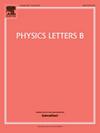f(Q) 引力中幂律和指数模型的制约因素
IF 4.5
2区 物理与天体物理
Q1 ASTRONOMY & ASTROPHYSICS
引用次数: 0
摘要
在本文中,我们利用 Pantheon+、哈勃测量数据和红移空间扭曲数据,从背景和扰动两个层面对 f(Q) 引力模型进行了观测检验。我们通过数值求解f(Q)引力的两种不同宇宙学模型(即幂律模型和指数模型)的修正弗里德曼方程,获得了最佳拟合参数。这需要对这些特定形式的 f(Q) 进行马尔可夫链蒙特卡罗分析。为了评估 f(Q) 引力模型的统计意义,我们使用了贝叶斯和校正阿凯克信息标准。结果表明,f(Q)引力中的指数模型在统计学上优于幂律模型和ΛCDM模型。本文章由计算机程序翻译,如有差异,请以英文原文为准。
Constraints on power law and exponential models in f(Q) gravity
In this paper, we observationally test the gravity model at both background and perturbation levels using Pantheon+, Hubble measurements, and Redshift Space Distortion Data. We obtain the best-fit parameters by solving numerically the modified Friedmann equations for two distinct cosmological models of gravity namely the Power law and Exponential models. This involves performing a Markov Chain Monte Carlo analysis for these specific forms of . To evaluate the statistical significance of the gravity models, we use the Bayesian and corrected Akaike Information Criteria. Our results indicate that the Exponential model in gravity is statistically favored over both the Power-law model and the ΛCDM model.
求助全文
通过发布文献求助,成功后即可免费获取论文全文。
去求助
来源期刊

Physics Letters B
物理-物理:综合
CiteScore
9.10
自引率
6.80%
发文量
647
审稿时长
3 months
期刊介绍:
Physics Letters B ensures the rapid publication of important new results in particle physics, nuclear physics and cosmology. Specialized editors are responsible for contributions in experimental nuclear physics, theoretical nuclear physics, experimental high-energy physics, theoretical high-energy physics, and astrophysics.
 求助内容:
求助内容: 应助结果提醒方式:
应助结果提醒方式:


